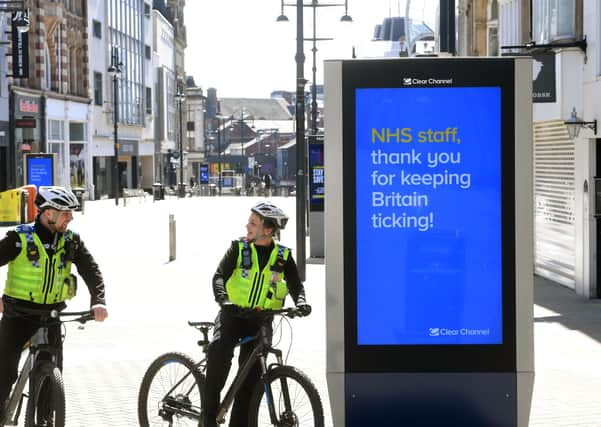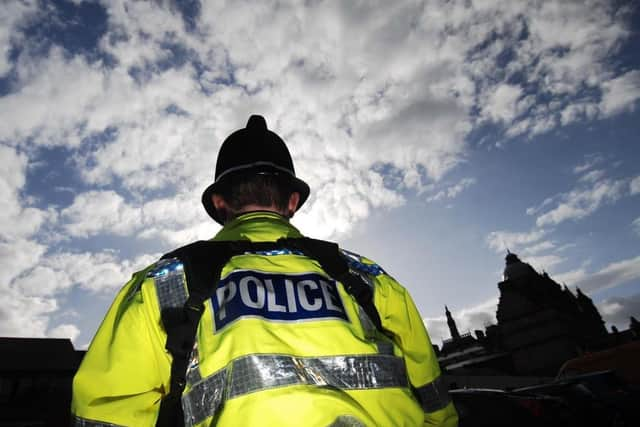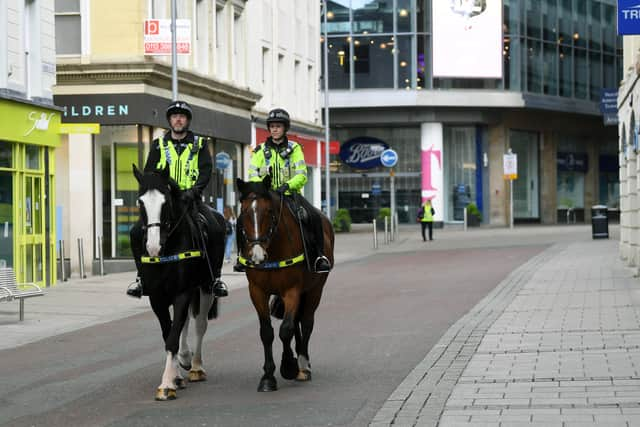Police patrols do cut crime; here’s the proof and let’s keep it that way – Andrew Vine


Crime has fallen dramatically during the lockdown, and one resolution for us all as the country moves tentatively towards some sort of normality must be to keep it that way.
According to the National Police Chiefs’ Council, in the four weeks to May 10, crime overall is down by 25 per cent compared with the same period last year.
Advertisement
Hide AdAdvertisement
Hide AdSpecific categories fell even further – rape by 28 per cent, burglaries by 36 per cent, vehicle crime by 40 per cent and assaults by 30 per cent. Disturbingly though, domestic violence rose by four per cent.


The closure of pubs and clubs undoubtedly plays a big part in the fall in assaults, which are often fuelled by drink, and people being at home for much of the time must be a deterrent to burglars and car thieves.
But there’s surely another factor at work here – the new-found visibility of police on time-honoured foot patrol.
In my corner of Yorkshire, it’s rare to see officers on the beat rather than in patrol cars. But since the lockdown, they’ve been around, and it’s the most welcome of sights.
Advertisement
Hide AdAdvertisement
Hide AdAnd unlike the Durham officers who found Dominic Cummings, the hypocritical adviser to the Prime Minister who had broken the lockdown by travelling 260 miles, a contemptible example of “do as I say, not what I do”, the police in my area haven’t had to deal with any breaches that I know of. Instead, they’ve made friends and useful contacts. That’s no surprise, because people like seeing officers around. It’s reassuring and it’s a deterrent.


Like many other areas, mine has its share of small-time crooks with ever-lengthening criminal records. Everybody knows who they are and so do the police.
Since officers have been on patrol, they’ve been noticeably quieter. The late-night comings and goings of cars – often a hallmark of drug-dealing – have stopped.
Knowing the police are around, and that there is a greater chance of being caught, makes wrongdoers keep their heads down. Maybe it might even persuade some that crime isn’t worth the hassle.
Advertisement
Hide AdAdvertisement
Hide AdThere have been other benefits. Officers and residents have come to know each other – simply stopping to chat to people out in their front gardens will have been useful to police out on patrol.
I know neighbours who have passed on tips about suspicious activity – nothing to do with infringing the lockdown – that could prove to be valuable intelligence, maybe even a piece in a jigsaw that enables police to clear up a crime that has previously been reported.
This sort of dialogue only happens in face-to-face conversations, when residents have the time and opportunity to explain what they have seen and why they thought it suspicious, and officers can get a feel for the area where it has happened. A closer bond between police and public is good for everybody apart from the criminals.
It’s an old-fashioned concept to have police on the beat – and one that takes up a lot of resources when all forces have fewer officers than they need – but it works.
Advertisement
Hide AdAdvertisement
Hide AdA former chief constable I know insists that foot patrols are of immense value in both solving crime and deterring it from happening. He started out on the beat, and by simply talking to people, every shift yielded intelligence about who was responsible for wrongdoing in his area.
Those same patrols also brought him into contact with young people at risk of going off the rails and parents worried about what to do. Talking helped save them, as did liaising with other agencies which offered help and support.
He can never know for sure how many people were stopped from being sucked in to criminality as a result – and nor can the countless other officers who have intervened in the same way – but their work is a service both to society and the families involved.
And it can’t happen without the personal touch. The police have the most difficult of jobs, which grow harder with every passing year as new challenges present themselves.
Advertisement
Hide AdAdvertisement
Hide AdThe Government has already launched the recruitment drive for 20,000 more officers to plug the gaps forces are struggling to contend with.
When they are finally in place, which will take time, greater emphasis should be put on forging closer links with communities by maintaining a high-profile presence on the streets with foot patrols.
These past few difficult weeks have shown that it works, just as they have demonstrated how important good neighbours are. Our communities are stronger for that, and part of their fabric has become the friendly, reassuring presence of police on the beat.
Once this is all over, we’d like to hang onto them.
Editor’s note: first and foremost - and rarely have I written down these words with more sincerity - I hope this finds you well.
Advertisement
Hide AdAdvertisement
Hide AdAlmost certainly you are here because you value the quality and the integrity of the journalism produced by The Yorkshire Post’s journalists - almost all of which live alongside you in Yorkshire, spending the wages they earn with Yorkshire businesses - who last year took this title to the industry watchdog’s Most Trusted Newspaper in Britain accolade.
And that is why I must make an urgent request of you: as advertising revenue declines, your support becomes evermore crucial to the maintenance of the journalistic standards expected of The Yorkshire Post. If you can, safely, please buy a paper or take up a subscription. We want to continue to make you proud of Yorkshire’s National Newspaper but we are going to need your help.
Postal subscription copies can be ordered by calling 0330 4030066 or by emailing [email protected]. Vouchers, to be exchanged at retail sales outlets - our newsagents need you, too - can be subscribed to by contacting subscriptions on 0330 1235950 or by visiting www.localsubsplus.co.uk where you should select The Yorkshire Post from the list of titles available.
If you want to help right now, download our tablet app from the App / Play Stores. Every contribution you make helps to provide this county with the best regional journalism in the country.
Sincerely. Thank you.
James Mitchinson
Comment Guidelines
National World encourages reader discussion on our stories. User feedback, insights and back-and-forth exchanges add a rich layer of context to reporting. Please review our Community Guidelines before commenting.